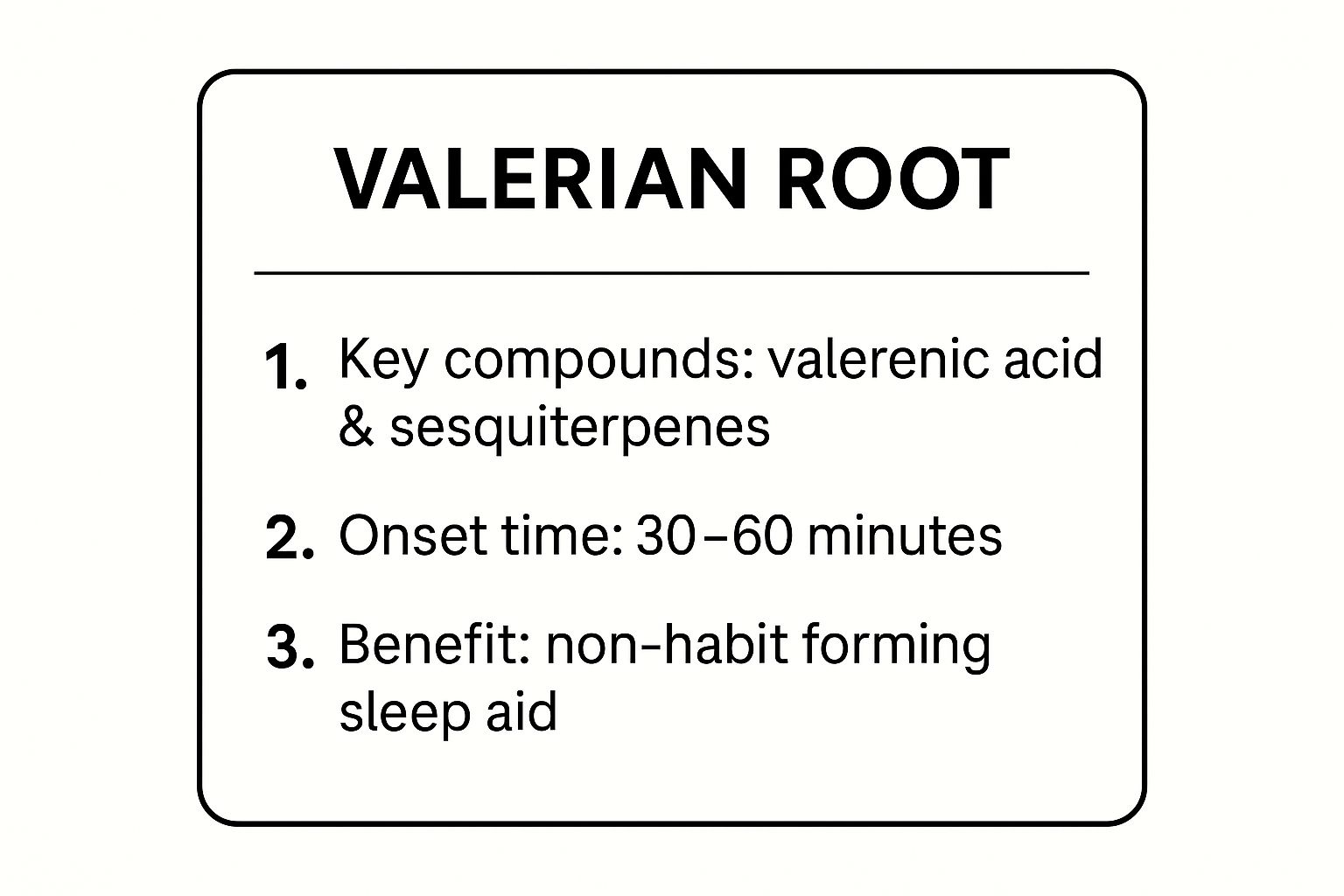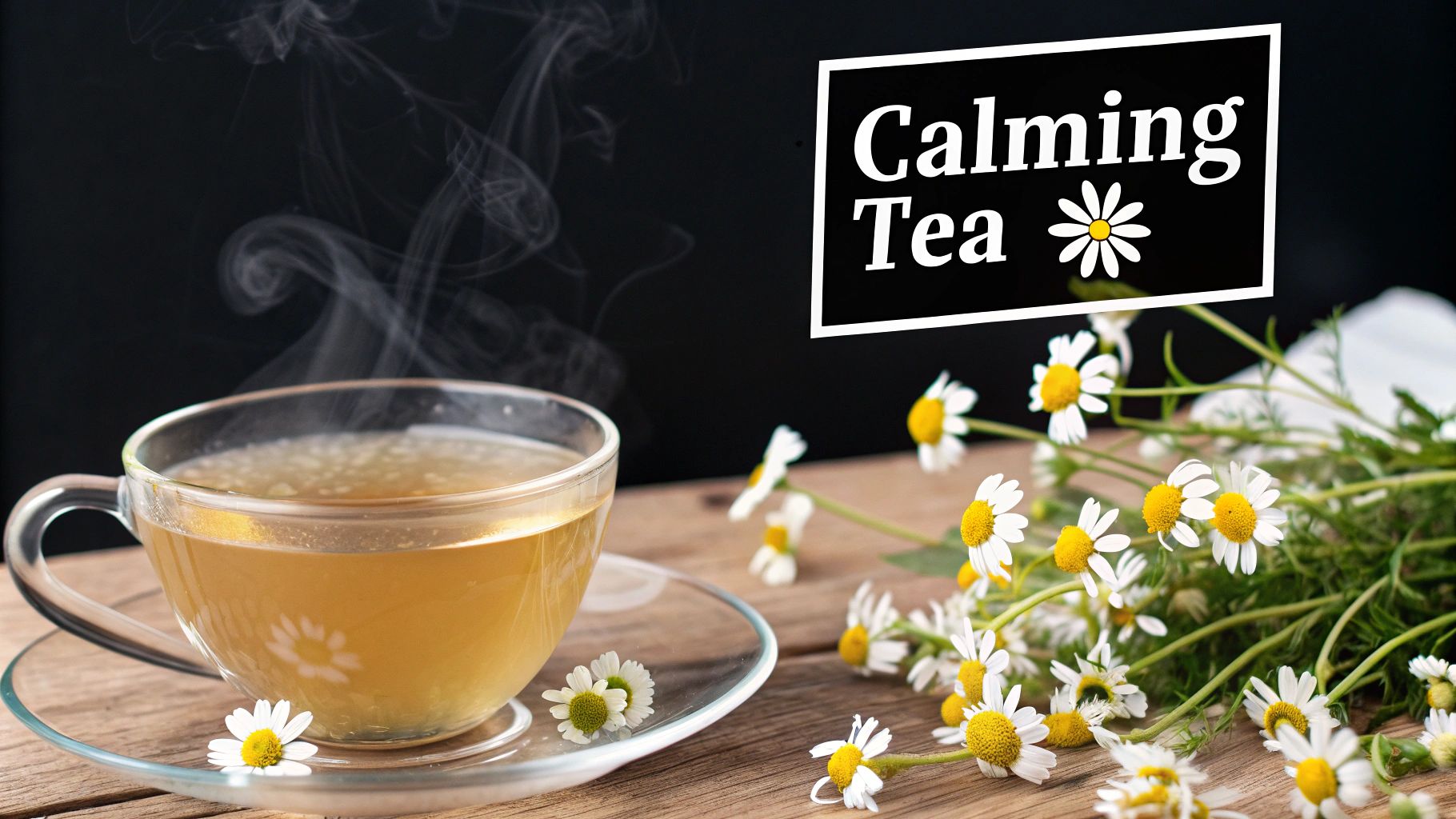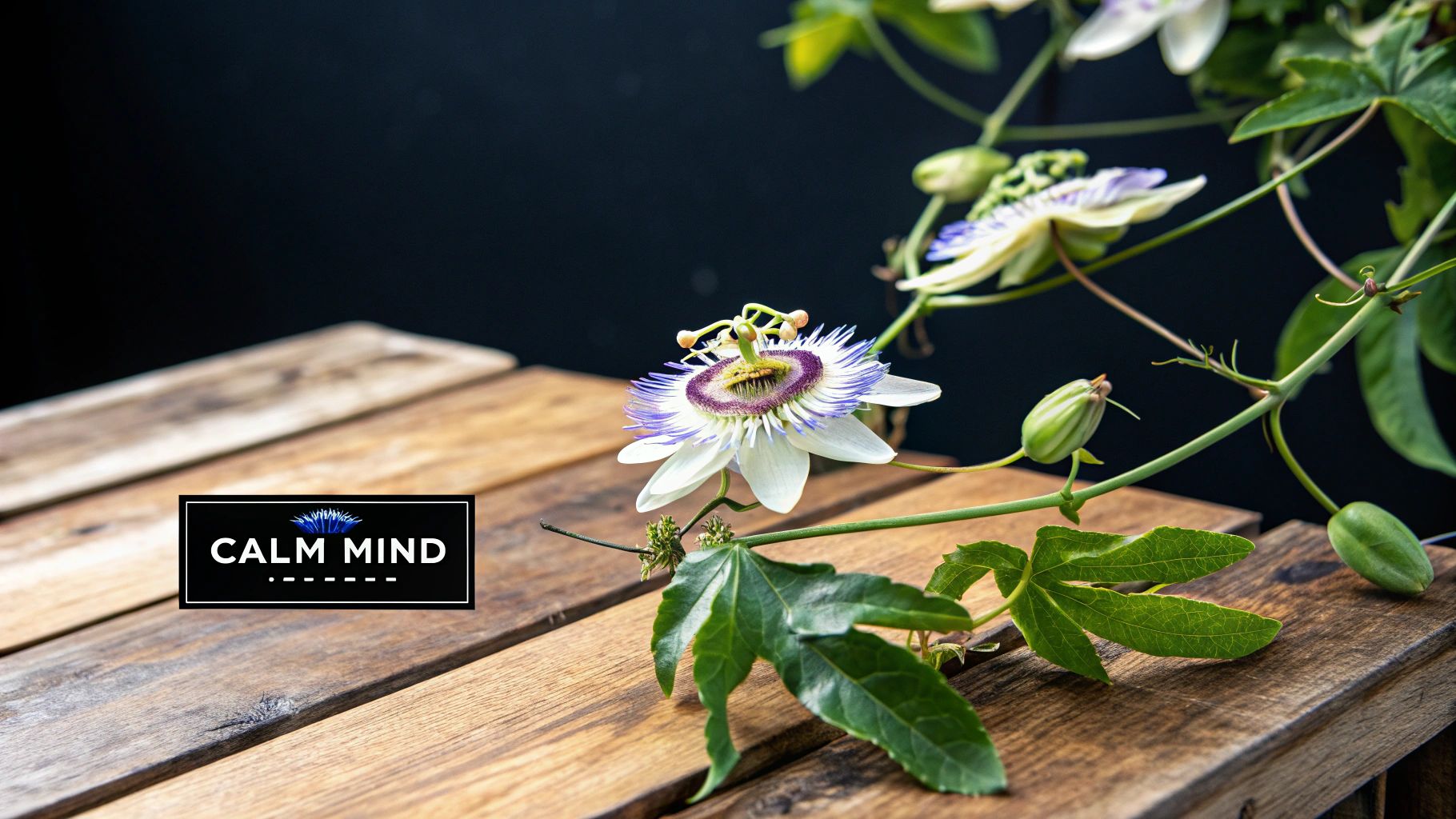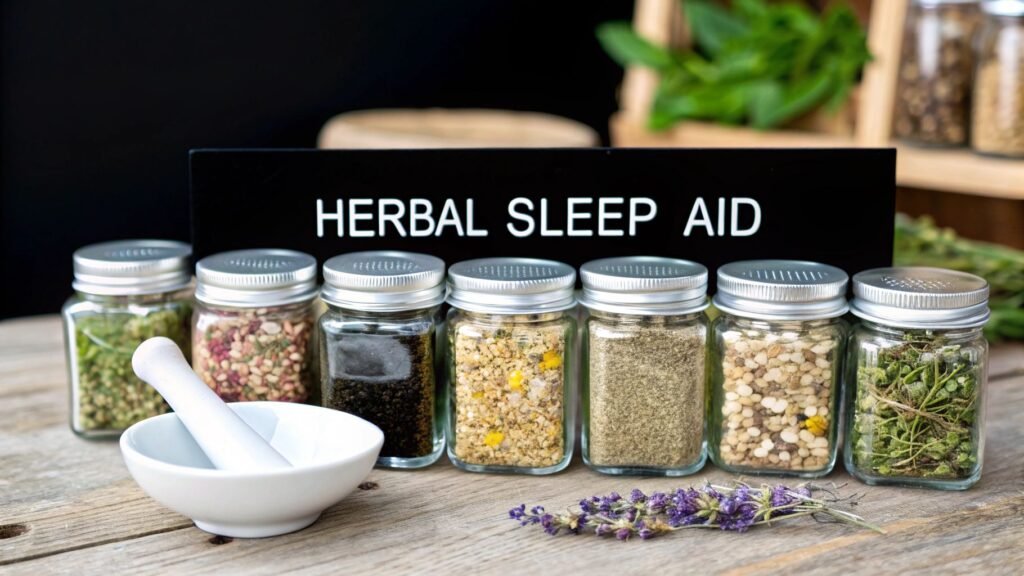In our fast-paced world, a restful night's sleep often feels like a luxury. For the millions struggling with insomnia, the search for a safe, effective, and non-habit-forming solution is a top priority. While prescription sleep aids have their place, a growing body of scientific evidence supports the use of traditional herbal remedies for insomnia. These botanicals, used for centuries across various cultures, offer a gentler approach to calming the nervous system, reducing anxiety, and promoting the deep, restorative sleep your body craves.
This guide moves beyond generic advice to provide an in-depth exploration of the most effective herbal sleep aids. We will delve into the science behind how each herb works, its unique benefits for promoting rest, specific preparation methods, and crucial safety considerations. Understanding these powerful plants is the first step toward creating a personalized, natural sleep strategy that works for you. Whether you experience trouble falling asleep, staying asleep, or simply wish to improve your overall sleep quality, this evidence-based roundup will equip you with the knowledge to make informed decisions for a more peaceful night and reclaim your rest.
1. Valerian Root (Valeriana officinalis)
Valerian root is one of the most well-researched and historically significant herbal remedies for insomnia. Revered for centuries in traditional European medicine, it is often referred to as "nature's Valium" due to its powerful sedative effects. Its efficacy stems from a complex synergy of compounds, primarily valerenic acid and various sesquiterpenes, which are believed to interact with the brain's gamma-aminobutyric acid (GABA) system. By inhibiting the breakdown of GABA, a key neurotransmitter that reduces neuronal excitability, valerian promotes a state of calm and facilitates the transition to sleep.
This herb's reputation is supported by its use in clinical settings. For example, it's a common prescription in European hospitals and by naturopathic doctors globally as a non-pharmaceutical sleep aid. You can also find it as a primary ingredient in popular commercial sleep formulas, such as Celestial Seasonings Sleepytime Extra tea.
How to Use Valerian Root
To effectively use valerian as a sleep aid, timing and dosage are crucial. It's best suited for individuals who struggle with falling asleep due to restlessness or anxiety.
- Recommended Dosage: Start with a standardized extract containing 0.8% valerenic acid. A typical dose is 300-600 mg taken 30 to 60 minutes before bedtime.
- Method of Preparation: Valerian is available in several forms, including capsules, tinctures, and teas. Capsules provide the most consistent and reliable dosage.
- Safety First: Begin with the lowest effective dose to assess your body's response. It's important to avoid combining valerian with alcohol or other sedatives, as this can cause excessive drowsiness.
For a quick overview, this summary box highlights the essential details for using valerian root.

These key takeaways show that valerian is a fast-acting, non-addictive option, making it a reliable choice among herbal remedies for insomnia for those seeking a natural path to better rest.
2. Chamomile (Matricaria chamomilla)
Chamomile is perhaps the most universally recognized and gentlest of herbal remedies for insomnia. This mild, daisy-like flower has been a staple in traditional medicine for millennia, from ancient Egypt and Persia to modern-day Europe, where it is used in German hospitals as a sleep aid. Its calming properties are primarily attributed to apigenin, a flavonoid that binds to specific receptors in the brain, inducing a mild tranquilizing effect that helps soothe the nervous system and prepare the body for sleep.

The widespread appeal of chamomile is evident in its commercial success. Leading brands like Twinings and Celestial Seasonings have made chamomile tea a nightly ritual for millions worldwide. Its reputation as a safe, effective, and accessible sleep aid is also endorsed by regulatory bodies like Germany's Commission E, which has approved its use for nervous restlessness and sleep disturbances.
How to Use Chamomile
To harness chamomile's sleep-promoting benefits, proper preparation is key. It's an excellent choice for those who experience mild sleep onset issues or simply want to unwind after a stressful day.
- Recommended Dosage: For tea, steep 1 to 2 heaping teaspoons of dried flowers (or 1-2 pre-made tea bags) in 8 ounces of hot water for 10-15 minutes. For extracts or capsules, a typical dose is 220-1100 mg daily.
- Method of Preparation: Tea is the most traditional and popular method, often consumed 30 to 45 minutes before bedtime. It's important to use German chamomile (Matricaria chamomilla), as it is considered more potent for sleep than Roman chamomile.
- Safety First: Chamomile is very safe for most people, but those with allergies to plants in the daisy family (like ragweed or marigolds) may have a reaction. It can also be combined with other calming herbs like lavender or lemon balm to enhance its effects.
For a quick overview, this summary box highlights the essential details for using chamomile.
Chamomile at a Glance:
- Primary Use: Mild insomnia, relaxation, stress reduction
- Key Compound: Apigenin
- Best For: Individuals who need help unwinding before bed
- Common Forms: Tea, capsules, tincture, essential oil
These key takeaways show that chamomile is a gentle, safe, and widely available option, making it a foundational choice among herbal remedies for insomnia for those seeking a soothing and natural way to improve sleep quality.
3. Passionflower (Passiflora incarnata)
Passionflower is a gentle yet effective herbal remedy for insomnia, particularly for those whose sleeplessness is driven by anxiety and racing thoughts. This climbing vine, with its strikingly intricate flowers, has a rich history of use, first by Native American tribes like the Cherokee and later adopted by European herbalists. Its calming properties are attributed to compounds like chrysin and vitexin, which are believed to enhance the activity of GABA in the brain, quieting the central nervous system and promoting relaxation without causing morning grogginess.

Its reputation as a premier anxiolytic herb is well-established in modern phytotherapy. Passionflower is frequently prescribed in European clinics for nervous restlessness and is a key ingredient in popular over-the-counter formulas, such as Bach's Rescue Remedy Sleep. This makes it one of the most trusted herbal remedies for insomnia when the primary obstacle to sleep is a busy, worried mind. For those interested in a deeper dive, you can learn more about how to reduce anxiety naturally on drerictsai.com.
How to Use Passionflower
To best leverage passionflower's calming effects, it should be taken shortly before bed to help quiet the mind and prepare the body for rest. It is particularly useful for individuals who find it difficult to "switch off" their thoughts at night.
- Recommended Dosage: For a standardized extract, a dose of 90-360 mg taken 30 to 60 minutes before bedtime is typical.
- Method of Preparation: Passionflower is most commonly found in capsules, tinctures, and teas. Tinctures and teas are absorbed quickly, while capsules offer a more precise dose.
- Safety First: Always start with the lowest dose to assess your sensitivity. Passionflower can be safely combined with other calming herbs like lemon balm for a synergistic effect, but you should avoid it if you are taking blood pressure medications due to potential interactions.
4. Lavender (Lavandula angustifolia)
Lavender is a widely celebrated herb known for its calming aroma and therapeutic properties, making it a unique and versatile choice among herbal remedies for insomnia. Its effectiveness is attributed to active compounds like linalool and linalyl acetate, which exert sedative and anxiolytic (anti-anxiety) effects on the nervous system. What sets lavender apart is its dual-application method; it works both when ingested and when used for aromatherapy, a practice supported by extensive research into its sleep-improving benefits.
The power of lavender is recognized in various professional and commercial settings. For instance, many hospitals have integrated lavender aromatherapy into patient care programs to reduce stress and promote rest. Its prominence is also evident in the global sleep product industry, with brands like L'Occitane and This Works incorporating its essence into luxury pillow sprays and lotions designed to enhance sleep quality.
How to Use Lavender
Lavender is particularly beneficial for individuals whose insomnia is linked to stress, anxiety, or an overactive mind. Its gentle nature makes it suitable for creating a calming pre-sleep ritual.
- Recommended Dosage: There is no standard oral dose, but for aromatherapy, using 2-3 drops of high-quality essential oil on a pillow or in a diffuser is effective. For teas, use 1-2 teaspoons of dried flowers per cup of hot water.
- Method of Preparation: Lavender can be enjoyed as a tea, used as an essential oil for diffusion or topical application, or added as dried flowers to a warm bath. Choose English lavender (Lavandula angustifolia) for its gentler, more therapeutic properties compared to other varieties.
- Safety First: When using essential oils, always dilute with a carrier oil before applying to the skin to prevent irritation. Start with a small amount to ensure you don't have a sensitivity to its strong scent.
Exploring the connection between scent and relaxation can be a powerful tool. For those interested in holistic approaches to stress, which is often a root cause of insomnia, acupuncture for stress management offers another avenue for promoting calm.
These key takeaways show that lavender's strength lies in its gentle, versatile application, making it an excellent option for those looking to create a serene environment conducive to deep, restorative sleep.
5. Lemon Balm (Melissa officinalis)
Lemon balm, a fragrant member of the mint family, has been cherished since medieval times for its gentle, calming properties. Often dubbed the 'calming herb' by herbalists, its primary action is to soothe the nervous system, making it an excellent choice for individuals whose insomnia is tied to stress and mental agitation. Its effectiveness is attributed to compounds like rosmarinic acid and citronellal, which are thought to enhance the activity of GABA in the brain and help reduce levels of the stress hormone cortisol, creating a peaceful state conducive to sleep.
The herb's long-standing reputation is backed by its historical and modern use in therapeutic settings. For centuries, it was cultivated in European monasteries for its medicinal virtues and is still prescribed in German phytotherapy for nervous sleep disorders. You can find high-quality lemon balm products from respected suppliers like Mountain Rose Herbs and in tea form from brands such as Alvita. This herb is a cornerstone among herbal remedies for insomnia, especially for those needing to quiet a racing mind.
How to Use Lemon Balm
To get the most benefit from lemon balm for sleep, it's best used as a regular evening ritual to help unwind from daily stressors. It is particularly effective for those who find it difficult to relax before bed.
- Recommended Dosage: Steep 1-2 teaspoons of dried leaves (or a tablespoon of fresh leaves) in a cup of hot water for 10-15 minutes. For extracts or capsules, follow the manufacturer's instructions, typically around 300-500 mg before bed.
- Method of Preparation: Tea made from fresh or dried leaves is the most traditional and aromatic method. It can also be found in tinctures and capsules, often combined with other calming herbs like chamomile or passionflower for a synergistic effect.
- Safety First: While generally safe, lemon balm should be avoided by individuals with thyroid conditions as it may interfere with thyroid hormone function. Always start with a lower dose to see how your body responds before increasing.
6. Magnolia Bark (Magnolia officinalis)
Magnolia bark is a cornerstone of Traditional Chinese Medicine (TCM), where it has been used for over a thousand years to treat anxiety and sleep disturbances. Its power as one of the most effective herbal remedies for insomnia lies in two bioactive compounds, honokiol and magnolol. These potent neolignans work by binding to the brain's GABA receptors, which helps calm the nervous system, and by reducing levels of the stress hormone cortisol. This dual-action mechanism makes it especially beneficial for individuals whose sleep is disrupted by stress and anxiety, particularly those who wake up frequently throughout the night.
The herb's traditional use is now being validated by modern science and has gained traction in Western markets. It is a key component in classic TCM formulas like An Shen Ding Zhi Wan, prescribed for calming the spirit. Today, you can find it in modern supplements like the patented extract Relora or as a standalone product from brands such as NOW Foods, highlighting its crossover appeal. Japanese sleep research centers have also studied its effects, further cementing its reputation.
How to Use Magnolia Bark
To leverage magnolia bark's stress-reducing and sleep-promoting properties, consistent use is key. It is best for people who struggle with staying asleep or wake up feeling wired and tired.
- Recommended Dosage: A typical dose is 200-400 mg of a standardized extract taken about an hour before bedtime.
- Method of Preparation: Magnolia bark is most commonly available in capsules or as a powdered extract, which ensures a consistent and accurate dose of honokiol and magnolol.
- Safety First: Start with a lower dose to assess your tolerance. For optimal results, take it consistently for two to three weeks. Do not combine magnolia bark with alcohol or other sedatives to avoid excessive drowsiness.
For those interested in exploring TCM's approach to wellness further, you can learn more about its applications for conditions like chronic pain.
The key takeaway is that magnolia bark offers a targeted solution for stress-induced insomnia, helping regulate the body's physiological response to anxiety and promoting deeper, more restorative rest.
7. California Poppy (Eschscholzia californica)
California poppy is a gentle yet effective herbal remedy for insomnia, prized for its ability to soothe the nervous system without the addictive properties of its distant relative, the opium poppy. Native to the western United States and the state flower of California, it was traditionally used by Native American tribes, including the Ohlone, for pain relief and to encourage restful sleep. Its benefits are attributed to a unique blend of alkaloids, such as californidine and protopine, which have mild sedative and analgesic (pain-relieving) properties that help quiet a restless mind and body.
Unlike more potent sedatives, California poppy works by gently normalizing psychological function, making it an excellent choice for sleep issues linked to anxiety, over-excitement, or mild pain. It is frequently incorporated into European phytotherapy combinations and can be found in gentle sleep formulas, even those designed for children. Brands like Gaia Herbs and Herb Pharm feature it prominently in their sleep support tinctures, highlighting its trusted status in modern herbalism.
How to Use California Poppy
To harness its calming effects, California poppy should be used consistently before bed. It is particularly well-suited for individuals whose insomnia stems from nervousness or physical discomfort.
- Recommended Dosage: For a tincture, a typical dose is 30-40 drops in a small amount of water, taken 30 minutes before bedtime. As a tea, infuse 1-2 teaspoons of the dried herb in hot water for 10 minutes.
- Method of Preparation: It is most commonly available as a liquid tincture or a dried herb for tea. Tinctures offer a more concentrated and fast-acting dose.
- Safety First: Because it can cause mild drowsiness, avoid driving or operating heavy machinery after taking it. Start with a lower dose to see how it affects you. It is generally considered safe but consult a healthcare provider before use, especially for children or if you are pregnant or breastfeeding.
California poppy is a mild, non-addictive option among herbal remedies for insomnia, ideal for those seeking a gentle transition into sleep without the risk of grogginess the next morning.
8. Jujube Date (Ziziphus jujuba)
Known in Traditional Chinese Medicine (TCM) as ‘Da Zao’, the jujube date is a revered food and potent medicinal herb used to nourish the blood and calm the mind. Its effectiveness as one of the key herbal remedies for insomnia lies in its rich concentration of saponins and flavonoids. These bioactive compounds are believed to modulate neurotransmitter activity, particularly within the serotonin and GABA pathways, which are essential for regulating mood and promoting sleep onset.
The fruit is widely used, but the seed, called 'Suan Zao Ren', is especially prized in TCM for its powerful sedative properties to treat insomnia, anxiety, and restlessness. Its long history of use is evident in its prescription in TCM clinics worldwide, from major suppliers like Mayway Corporation to specialized apothecaries. You will also find it used in Korean traditional medicine (as Daechu) and integrated into Middle Eastern and Mediterranean culinary traditions for its calming effects.
How to Use Jujube Date
To harness the sleep-promoting benefits of jujube, it can be incorporated as both a food and a medicinal preparation. It is particularly helpful for those whose insomnia is linked to mental agitation or a feeling of being "unsettled."
- Recommended Dosage: Consume 10 to 15 dried jujube dates as a simple bedtime snack. For a more potent effect using the seeds (Suan Zao Ren), simmer 6-15 grams in water for 20 minutes to create a calming tea.
- Method of Preparation: The fruit can be eaten dried or made into a tea. The seeds should be lightly crushed and simmered to extract their therapeutic compounds. For enhanced efficacy, TCM practitioners often combine jujube with other synergistic herbs.
- Safety First: Jujube is generally considered a very safe food-grade herb with few side effects. As with any new remedy, start with a smaller amount to see how your body responds. Soaking the seeds overnight before preparation can improve their digestibility and potency.
Herbal Remedies for Insomnia: 8-Item Comparison
| Item | Implementation Complexity 🔄 | Resource Requirements ⚡ | Expected Outcomes 📊 | Ideal Use Cases 💡 | Key Advantages ⭐ |
|---|---|---|---|---|---|
| Valerian Root | Moderate – takes 2-4 weeks for full effect | Capsules, tinctures, teas; standardized extracts recommended | Improves sleep quality; reduces time to fall asleep | Chronic insomnia; non-habit forming aid | Clinically proven; non-habit forming; widely available |
| Chamomile | Low – simple tea preparation | Dried flowers, capsules, essential oils | Mild sedation and anxiety relief; short-lasting effects | Mild insomnia; children and elderly | Very safe; pleasant taste; minimal side effects |
| Passionflower | Moderate – fast acting (15-30 min onset) | Extracts required; dosage adjustment needed | Reduces anxiety-related insomnia; quick calming effect | Anxiety-induced insomnia; daytime anxiety | Fast-acting; non-drowsy next day; good for racing thoughts |
| Lavender | Low to moderate – multiple application methods | Essential oils, tea, bath additives | Improved sleep quality via aromatherapy and ingestion | Sleep environment enhancement; mild insomnia | Pleasant fragrance; versatile use; safe for children |
| Lemon Balm | Moderate – effects develop over weeks | Fresh/dried leaves for tea; capsules | Stress reduction; mood improvement; mild sedation | Stress-related insomnia; mood support | Pleasant taste; cognitive benefits; safe long-term use |
| Magnolia Bark | Moderate – consistent use over 2-3 weeks | Extracts or powders | Improves sleep maintenance; reduces stress | Trouble staying asleep; stress-related insomnia | Potent at low doses; non-habit forming; stress reduction |
| California Poppy | Low to moderate – milder sedative effects | Whole plant usage in teas or tinctures | Mild sedation; pain-related insomnia relief | Mild insomnia; pain-related sleep disruption | Non-addictive; well-tolerated; suitable for children |
| Jujube Date | Moderate – preparation of seeds needed | Fruit and seeds; soaking or simmering required | Calming effects; anxiety relief; nutritional support | Anxiety-related insomnia; digestive health | Dual nutritional and medicinal benefits; long traditional use |
Integrating Herbal Wisdom: Your Next Steps to Better Sleep
Embarking on a journey to find the right herbal remedies for insomnia can feel both empowering and overwhelming. Throughout this guide, we have explored a potent selection of nature’s most effective sleep aids, from the deeply sedating Valerian Root and Passionflower to the calming, stress-reducing properties of Chamomile, Lavender, and Lemon Balm. We've also delved into specialized options like Magnolia Bark for cortisol regulation, California Poppy for pain-related sleeplessness, and Jujube Date for its traditional role in calming the spirit. Each herb offers a unique pathway to rest, targeting different underlying causes of sleep disruption.
The most critical takeaway is that your path to better sleep is deeply personal. What works wonders for one person may not be the right fit for another. The effectiveness of these remedies hinges on understanding the root cause of your insomnia. Is it racing thoughts fueled by anxiety? Is it chronic pain that prevents you from finding a comfortable position? Or is it a fundamental imbalance that leaves you feeling wired and tired?
Charting Your Personalized Path to Rest
Successfully integrating herbal support into your life requires a thoughtful and strategic approach. It's not about randomly trying different tinctures, but about making informed choices that align with your body’s specific needs.
Here are your actionable next steps:
- Self-Assessment and Symptom Tracking: Before you start, keep a sleep diary for a week. Note when you go to bed, how long it takes to fall asleep, how many times you wake up, and how you feel in the morning. Also, log your stress levels, diet, and any physical discomfort. This data will reveal patterns and help you identify whether your insomnia is linked more to anxiety (consider Lavender or Lemon Balm), pain (California Poppy might be a good start), or difficulty staying asleep (Valerian Root could be beneficial).
- Start Low and Go Slow: When you select an herb to try, begin with the lowest recommended dose. This principle allows you to gauge your body's sensitivity and response without overwhelming your system. Give each herb a fair trial of at least one to two weeks before deciding on its effectiveness or increasing the dosage, always staying within safe limits.
- Prioritize Professional Guidance: This is the most crucial step. Natural does not mean universally safe. Herbal remedies can interact with prescription medications (like blood thinners, antidepressants, or blood pressure medication) and may be contraindicated for certain health conditions or during pregnancy. Consulting a professional is non-negotiable for safety and efficacy.
The Value of Expert Consultation
A qualified practitioner, especially one versed in Traditional Chinese Medicine (TCM), can provide a level of personalization that self-guidance cannot match. They can diagnose the specific pattern of disharmony causing your insomnia, whether it's "Heart Fire," "Liver Qi Stagnation," or "Kidney Yin Deficiency." This nuanced diagnosis allows for the creation of a custom herbal formula that addresses your unique constitution far more effectively than a single herb ever could. By partnering with an expert, you transform guesswork into a precise, holistic strategy, ensuring you are not just treating a symptom but restoring your body's innate ability to rest and rejuvenate.
Ready to move beyond trial and error and find a lasting solution for your sleep troubles? The experts at Eric Tsai Acupuncture and Herbs specialize in diagnosing the root cause of insomnia and creating personalized treatment plans that integrate the best of herbal medicine and acupuncture. Schedule a consultation at Eric Tsai Acupuncture and Herbs to begin your journey toward restorative, natural sleep.

